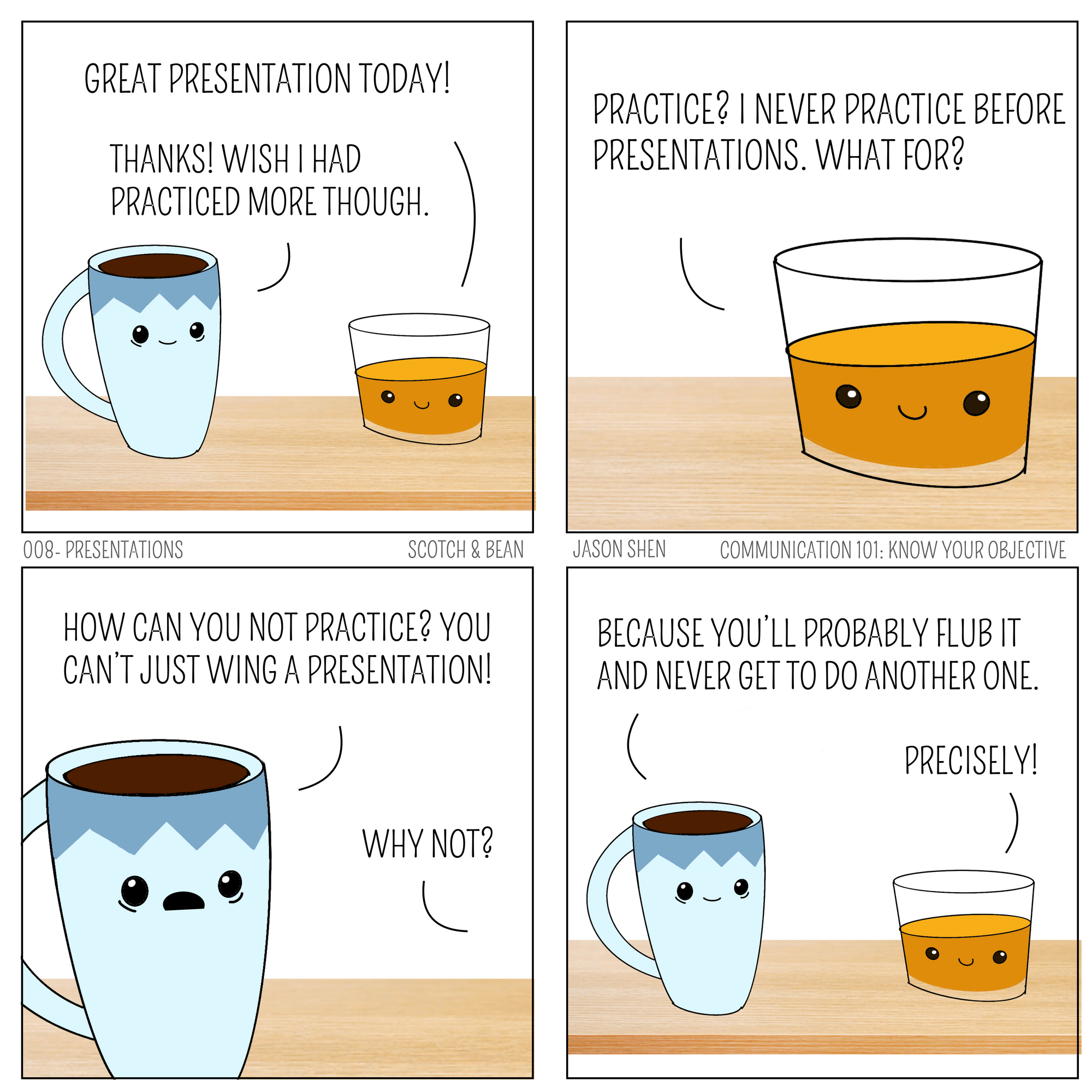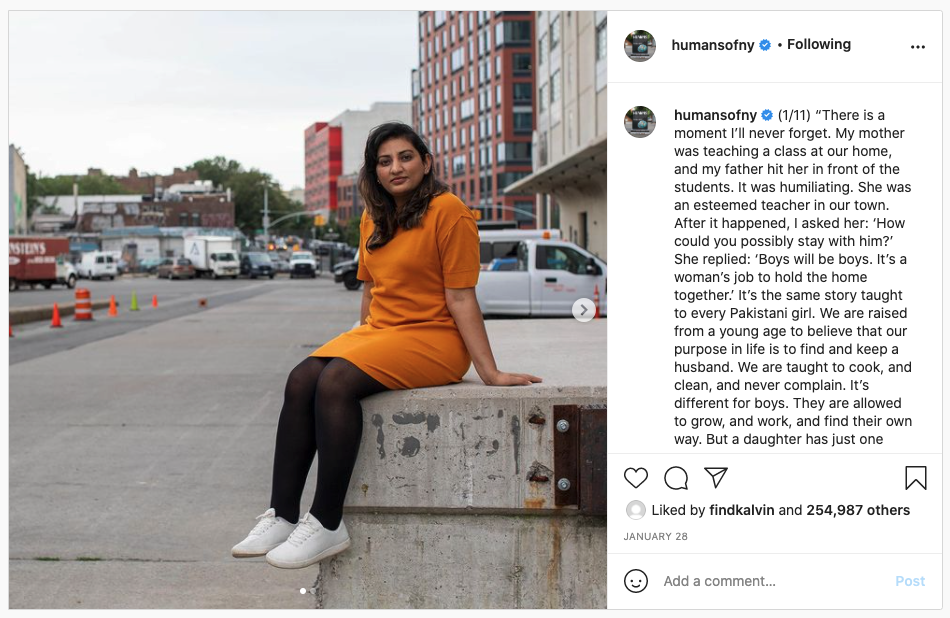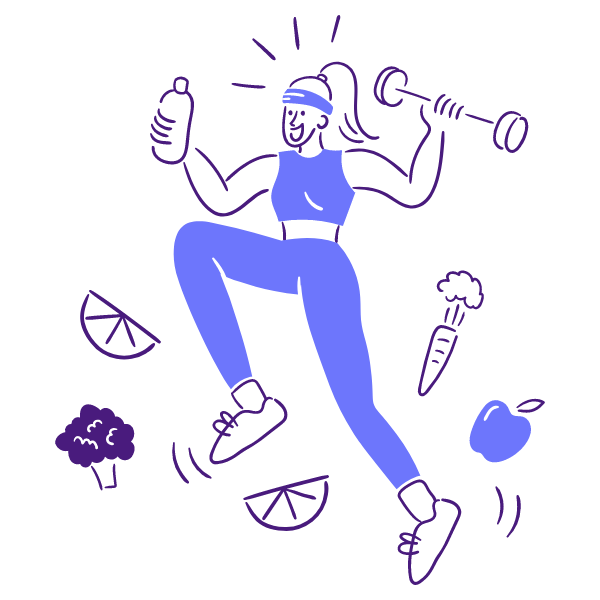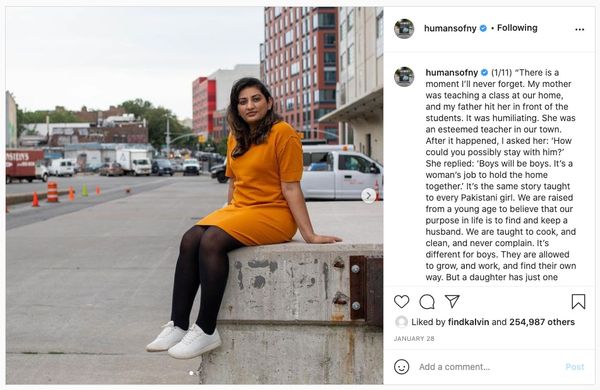💔 There has been a deeply disturbing rise in attacks on Asian Americans in recent weeks, including assault, robbery, and stabbing of men and women aged 64 to 91 years old. Michelle Kim has shared a wise and personal examination of the historic and current tensions between Asian and Black communities. Please look out for each other.
Oh hello there,
This is the 39th edition of Making Connections, where we take a random (illustrated) walk down tech, fitness, product thinking, org design, nerd culture, persuasion, and behavior change.
Like what you see? Why not bring someone to the party?
🖼 We Talkin about Practice

I had a couple of important presentations at work this past week and that inspired this comic. To be fair, I probably could have practiced more.
🧠 The Story of Sidra’s Startup
My sister Amy shared her story with me after finding it on Humans of New York’s Instagram. It’s a great read.

It’s the same story taught to every Pakistani girl. We are raised from a young age to believe that our purpose in life is to find and keep a husband. We are taught to cook, and clean, and never complain. It’s different for boys. They are allowed to grow, and work, and find their own way. But a daughter has just one path: to marry as quickly as possible. I always wanted more from life, even as a child. I wanted to create something. I wanted to be somebody. But there was nowhere to look for inspiration. The internet didn’t exist back then. And even on our television shows— women who wanted more than a family were depicted as villains.
This is a story about a woman named Sidra, who grew up in Pakistan wanting to do more with her life.
After high school I enrolled at a local boy’s college. I was one of fifteen girls at the entire school. And even though my grades were nothing special, I was very involved in student organizations. During my freshman year we had a giant flood in Pakistan, and many of us were searching for ways to help. My idea was to produce a play. We would stage the performance at a local theater, and all proceeds would go to victims of the flood. I organized everything myself: I wrote the script, I found the actors, I scheduled rehearsals at our home. It was the most powerful that I’d ever felt. And everything was coming together. But a few weeks into our rehearsals, the neighbors began to notice strange boys coming and going from our home. One morning my father called me into the living room. ‘The neighbors are gossiping,’ he said. ‘You are embarrassing our family.’
Sidra puts on the play anyway and it’s a smash.
He said that he’d discovered something called ‘the internet,’ and he was planning to start a business. Then he asked if I would join him in Lahore and become his business partner. He told me: ‘With someone like you on the team, people will take us seriously.’ It finally felt as though my talents were being recognized, and the next day I asked for my parent’s permission. But they refused. ‘It’s time to stop this foolishness,’ my mother said. Then she gave me an ultimatum: ‘Either become a teacher, or get married.'"
Sexism runs so fucking deep.
There were no windows. My mattress was on the floor. And I was sharing a room with three other girls, but none of this bothered me. Because I finally had my freedom. Waqas and I began working on our company right away. We named it ‘Social Media Art,’ and our plan was to help companies establish a presence on social media. But this was less than ten years after 9/11. There were still many sanctions on the economy. And Facebook was banned in Pakistan, so it wasn’t easy to find clients. We used KFC as our office because it was the only place with free WiFi. We were sharing a single laptop. All day long we’d email companies, asking for a meeting. At the time we were surviving off $100 a month that I earned from my tutoring gig.
But Sidra finds a way, even under the barest conditions.
I returned to the workshop a few weeks later. Once again the craftsmen offered me a chair, but this time I refused. I sat next to them on the muddy floor, and said: ‘Teach me everything you know.’ I wanted to learn it all: how to measure, how to make a pattern, how to tell the quality of leather. These men had been making shoes since they were kids, and I’m not sure they’d ever met someone so interested in their craft. They probably expected me to stay for thirty minutes, but I was there until the sun went down. And I came back seven times after that. In the end we agreed to collaborate on a collection. We would design the shoes together, and then market them on the internet. Waqas built our website while I focused on production.
I don’t want to ruin the ending of the story but it’s great. Go and read the entire thing on the Humans of New York Instagram with the photos (Part 1, Part 2, Part 3, Part 4, Part 5, Part 6, Part 7, Part 8, Part 9, Part 10, Part 11)1.
On a meta-note, I do think inspirational stories like this one are a double-edged sword. They can show us what is possible and how far someone can come, but at the same time, they can have a chilling effect on complaints or calls for reform. “Look at so-and-so, they did it without needing help”, when of course for every one slumdog millionaire there are countless others with great potential who were unable to make it due to outside forces, and plenty of mediocre folks who would never have the success they enjoy had they not been raised in a well-off environment.
👉 Afternoon Workouts

There’s a lot of support for morning workouts. It’s a time of day you have control over (if you wake up early enough) and you can shower if you need to before settling in for the work day. But when it comes to getting maximum benefit from your workout, you may want to consider the afternoon workout.
In a paper titled Exercise training elicits superior metabolic effects when performed in the afternoon compared to morning in metabolically compromised humans, researchers ran an experiment in men who were at risk, or had, Type 2 diabetes. The results found that afternoon workouts (3-6pm) were better at improving circadian rhythms (sleep cycles), insulin sensitivity (blood sugar), and fat loss compared to morning workouts (10am).
This is not quite the afternoon, but for the past few weeks, I’ve been blocking out an hour every day around 12:30 or 1pm to do a 20 mins workout and eat lunch away from my desk. And it’s been wonderful.
I’ve been using Apple Fitness+, Aaptiv, or following a Les Mills workout on YouTube. I can go harder when I’m more awake and getting away from my screen for a while really gives me more focus in the afternoon. Give it a shot!
That’s it for this week! Enjoy the long weekend and we’ll talk again soon.
-J
👨🏻💻 About Me
Jason Shen is an entrepreneur and business leader passionate about technology and human resilience. His past startups have reimagined transportation, recruiting, and gaming; backed by notable investors at Y Combinator, Techstars, and Amazon. As an operator, he’s built products and led teams at companies like Facebook, Etsy, and the Smithsonian.
Jason has written about productivity, resilience as well as the future of work in publications like Fast Company, VOX, TechCrunch and has spoken at events at TED, Google and The White House where his ideas have reached millions. He lives in Brooklyn with his wife, two kettlebells, and many piles of books.
If that’s too much trouble for you, my sister also “rolled up” the story into one page here. (Also this was partly just an excuse to use Substack’s new footnote feature)

